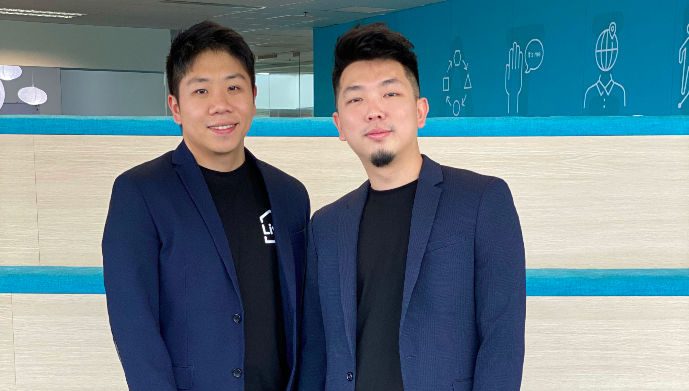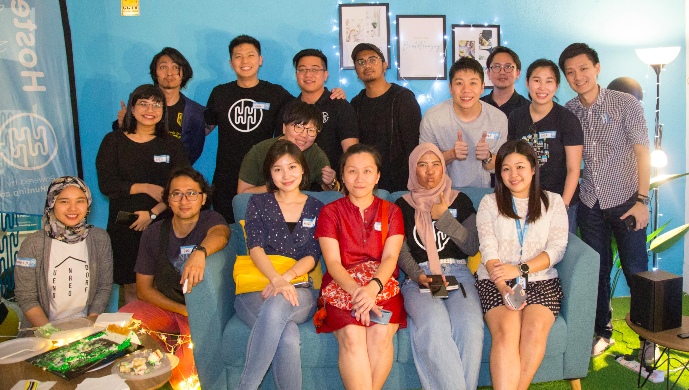
LiveIn Co-founders Joey Lim and Keek Wen Khai (R)
Malaysian co-living startup HostelHunting has just announced a new brand name LiveIn.com, which it believes better aligns with its goals and business model.
The company — kicked off in 2015 as an online marketplace for property owners and potential tenants to match — pivoted to a long-stay rental solutions provider in 2018. In its five years of its existence, HostelHunting has also raised about US$4.5 million from the likes of Jungle Ventures, Wavemaker Partners, Aucfan Co, KK Fund, Incubate Fund, and Cradle Fund.
LiveIn.com is now eyeing new markets, such as Indonesia and the Philippines, to expand its operations.
In this email interview, its Co-founder and CEO Keek Wen Khai speaks about the rebranding exercise, markets and opportunities.
Edited excerpts:
You started off as a room-rental property matching platform. What prompted you to pivot the business model to co-living in 2018. Was it because of the intense competition in the market or due to an unviable business model? Can you explain the reasons?
When we began our journey, we wanted to solve the long-stay rental space in its entirety, but in our roadmap decided to target niche-by-niche. That is how HostelHunting (HH) came about: used locally by students. We did very well with HostelHunting when we operated as a marketplace, becoming one of the largest room database listing platforms in Malaysia.
However, matching tenants and landlords weren’t enough and we wanted to do more. That was when we introduced the HH+ brand, a new hassle-free product where we take care of every aspect for tenants.
Related article: HostelHunting raises Series A, aims to “aggressively” drive further regional growth
Instead of just searching for a room, we will assist during that process, ensure your room is fitted according to our HH+ guidelines and criteria, and cover furnishing, WiFi, weekly cleaning, maintenance and even include a community manager to assist you on the site.
How do you compare your earlier business model with the new one? Have your revenues improved quite significantly after the pivot?
Our journey from marketplace to a property co-living solution was something that we had planned for in our business roadmap. As mentioned, we had questioned how we could add value to our customers, and this brought on HH+ which had sprung up very quickly, with 500 rooms under management to in the first year.
As we continued to improve customer service and satisfaction, we have grown in Malaysia and are quickly expanding in Thailand; with plans to further our foothold in Indonesia and the Philippines. All this could not have happened if we did not see improved revenue generated.
You describe yourself as a value-added co-living. What does it mean? How does it stand out in the market?
Value-added co-living means hassle-free and convenience in renting; all you need is your luggage of clothes, and you are settled in. With our tenant app, all maintenance, cleaning services, billing and utilities are accessible.
The tenants would also gain access to meeting their fellow LiveIn community dwellers in various exciting activations which we organize: movie nights, yoga sessions, event gatherings, etc.
So far, we have yet to actually see any other platforms offering these experiences.
How is this industry faring in Southeast Asia, especially your home market Malaysia? Has co-living as an industry matured and become a trend?
One of the biggest challenges was introducing this new concept to the market. It was a new concept to both tenants and landlords, and it was rather difficult explaining to owners why we need to offer basic necessities such as WiFi, fully furnished rooms, and a pleasant room and experience for tenants.
For tenants, though they were very happy with this service, it took some time to fully buy-in that it is a truly hassle-free experience, and that our community managers will be there to assist. It is a market of full potential and an unrealized need which we fulfil and as we go along educating the market; the growth we are seeing is fast!
How big is the opportunity in this space? What kind of students are you catering to with your platform?

The sky is the limit! There is definitely more opportunity to grow, with full-scale services and engagement for tenants. We are catering to anyone who is in need of a room or unit at strategic locations.
Also Read: Malaysian P2P car-sharing startup Moovby raises US$500K for expansion; to move HQs to Singapore
Our students base is that in their tertiary education phase; coming in from outside of the Klang Valley as they are new to the city (and also to the country). We also get students who are moving out of their family home to further their studies and try to make it on their own as we provide rooms at very prime locations, close to the campuses. Most of our student market only require safety and convenience; we provide that and more!
I understand you have operations in Thailand and Malaysia. But these two are different in terms of culture, language, etc. How did you tackle these challenges? What kind of potential do you see in Thailand?
Thailand is an extremely exciting place for us. Yes, the language barrier is there, but with the co-founders moving there, grasping the language and working with a local team who gets how the market works, we are confident that this will see us grow fast as we are starting a culture of hassle-free and fully serviced co-living space.
You would be surprised to see the current living conditions of many middle-income working adults; we really hope to disrupt that.
The Philippines and Indonesia are the two other markets in your expansion plans list. Can you shed lights on the co-living industries in these two markets?
We are still exploring the markets in these two countries, having visited a few times. We hope to share more once we have our plans.
Can you also talk about the overall co-living space in Southeast Asia? Who are the other key players?
We recognise that this space is somewhat growing with some key players. As mentioned, this region is undergoing an education phase and we hope to divulge more in the future.
What is the thought process behind rebranding? How will it benefit your startup?
This rebrand is only on the customer-facing avenues, but our company name remains the same. Having almost 46 per cent of our existing tenants who are working adults, we have gotten a lot of feedback from our working adult tenants who are enjoying our services and admitted they initially shied away due to our brand name. To ensure that we can continue to hit a larger target market, the rebranding would greatly assist on this.
You have already raised US$4.5M funding in multiple rounds. What are your future fundraising plans?
With backings from our investors, we are scaling the business and a rapid rate and we plan to continue fundraising to get us where we want to be.
The post ‘Introducing the concept of co-living was the biggest challenge for us’: LiveIn CEO Keek Wen Khai appeared first on e27.